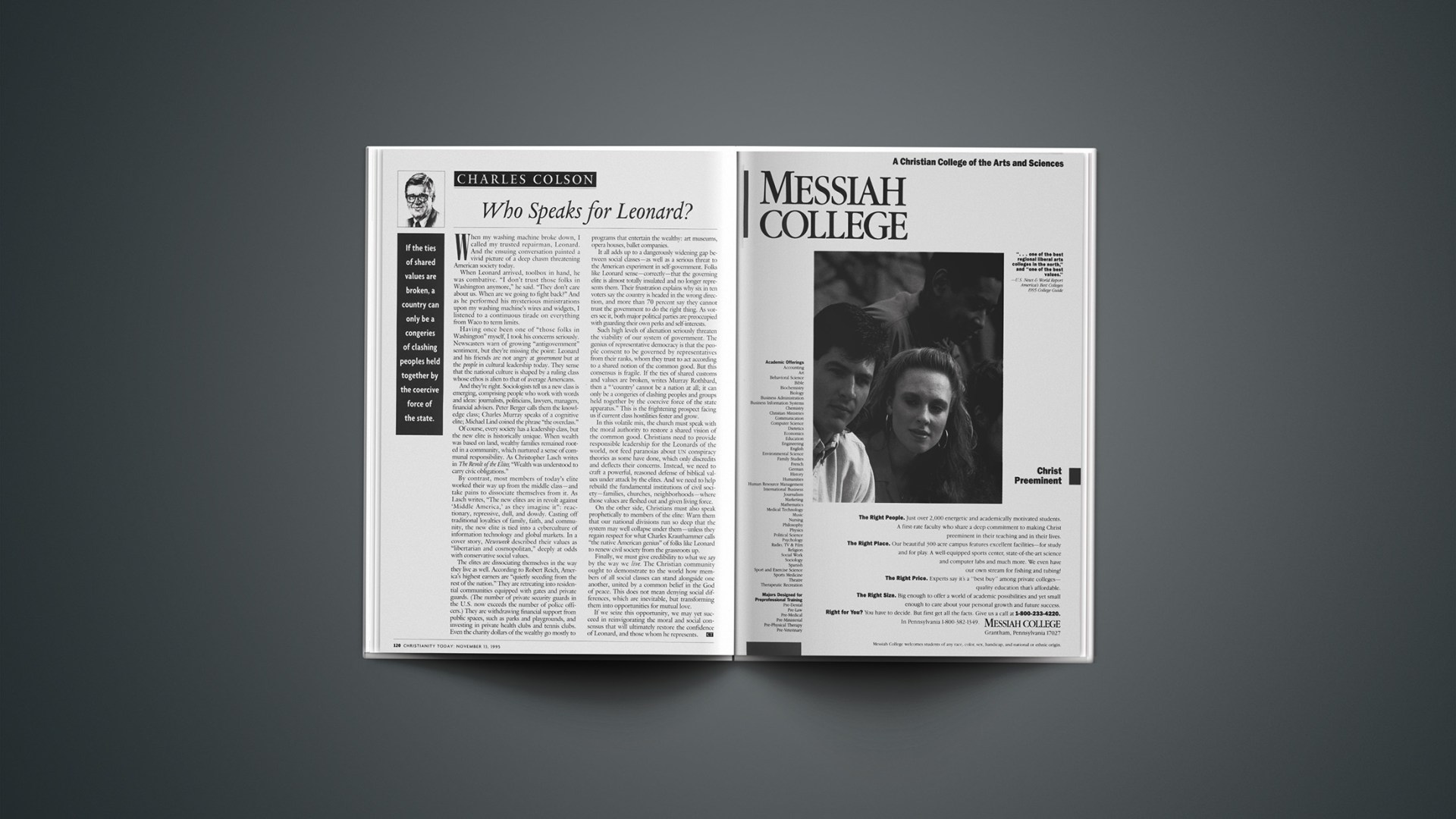If the ties of shared values are broken, a country can only be a congeries of clashing peoples held together by the coercive force of the state.
When my washing machine broke down, I called my trusted repairman, Leonard. And the ensuing conversation painted a vivid picture of a deep chasm threatening American society today.
When Leonard arrived, toolbox in hand, he was combative. “I don’t trust those folks in Washington anymore,” he said. “They don’t care about us. When are we going to fight back?” And as he performed his mysterious ministrations upon my washing machine’s wires and widgets, I listened to a continuous tirade on everything from Waco to term limits.
Having once been one of “those folks in Washington” myself, I took his concerns seriously. Newscasters warn of growing “antigovernment” sentiment, but they’re missing the point: Leonard and his friends are not angry at government but at the people in cultural leadership today. They sense that the national culture is shaped by a ruling class whose ethos is alien to that of average Americans.
And they’re right. Sociologists tell us a new class is emerging, comprising people who work with words and ideas: journalists, politicians, lawyers, managers, financial advisers. Peter Berger calls them the knowledge class; Charles Murray speaks of a cognitive elite; Michael Lind coined the phrase “the overclass.”
Of course, every society has a leadership class, but the new elite is historically unique. When wealth was based on land, wealthy families remained rooted in a community, which nurtured a sense of communal responsibility. As Christopher Lasch writes in “The Revolt of the Elites,” “Wealth was understood to carry civic obligations.”
By contrast, most members of today’s elite worked their way up from the middle class-and take pains to dissociate themselves from it. As Lasch writes, “The new elites are in revolt against ‘Middle America,’ as they imagine it”: reactionary, repressive, dull, and dowdy. Casting off traditional loyalties of family, faith, and community, the new elite is tied into a cyberculture of information technology and global markets. In a cover story, “Newsweek” described their values as “libertarian and cosmopolitan,” deeply at odds with conservative social values.
The elites are dissociating themselves in the way they live as well. According to Robert Reich, America’s highest earners are “quietly seceding from the rest of the nation.” They are retreating into residential communities equipped with gates and private guards. (The number of private security guards in the U.S. now exceeds the number of police officers.) They are withdrawing financial support from public spaces, such as parks and playgrounds, and investing in private health clubs and tennis clubs. Even the charity dollars of the wealthy go mostly to programs that entertain the wealthy: art museums, opera houses, ballet companies.
It all adds up to a dangerously widening gap between social classes—as well as a serious threat to the American experiment in self-government. Folks like Leonard sense—correctly—that the governing elite is almost totally insulated and no longer represents them. Their frustration explains why six in ten voters say the country is headed in the wrong direction, and more than 70 percent say they cannot trust the government to do the right thing. As voters see it, both major political parties are preoccupied with guarding their own perks and self-interests.
Such high levels of alienation seriously threaten the viability of our system of government. The genius of representative democracy is that the people consent to be governed by representatives from their ranks, whom they trust to act according to a shared notion of the common good. But this consensus is fragile. If the ties of shared customs and values are broken, writes Murray Rothbard, then a ” ‘country’ cannot be a nation at all; it can only be a congeries of clashing peoples and groups held together by the coercive force of the state apparatus.” This is the frightening prospect facing us if current class hostilities fester and grow.
In this volatile mix, the church must speak with the moral authority to restore a shared vision of the common good. Christians need to provide responsible leadership for the Leonards of the world, not feed paranoias about UN conspiracy theories as some have done, which only discredits and deflects their concerns. Instead, we need to craft a powerful, reasoned defense of biblical values under attack by the elites. And we need to help rebuild the fundamental institutions of civil society—families, churches, neighborhoods—where those values are fleshed out and given living force.
On the other side, Christians must also speak prophetically to members of the elite: Warn them that our national divisions run so deep that the system may well collapse under them—unless they regain respect for what Charles Krauthammer calls “the native American genius” of folks like Leonard to renew civil society from the grassroots up.
Finally, we must give credibility to what we say by the way we live. The Christian community ought to demonstrate to the world how members of all social classes can stand alongside one another, united by a common belief in the God of peace. This does not mean denying social differences, which are inevitable, but transforming them into opportunities for mutual love.
If we seize this opportunity, we may yet succeed in reinvigorating the moral and social consensus that will ultimately restore the confidence of Leonard, and those whom he represents.
Copyright © 1995 Christianity Today. Click for reprint information.










